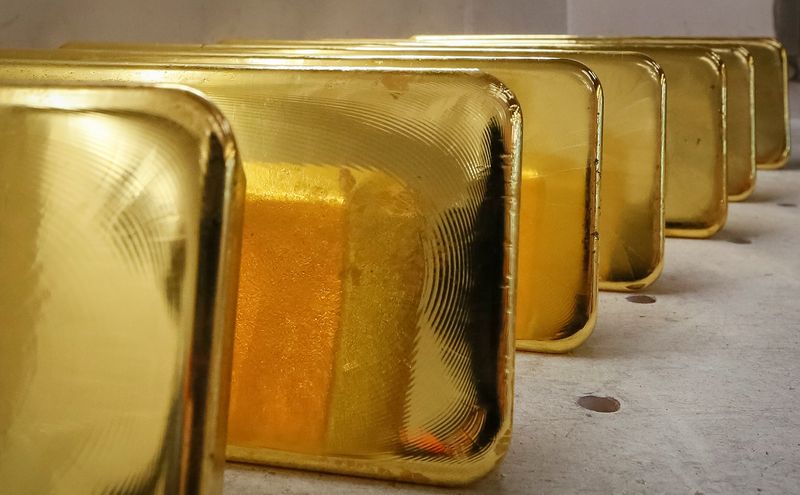LONDON (Reuters) - Exchange-traded funds (ETFs) are one of the most popular ways to invest in gold. Shares represent gold bars held in vaults and are easy to buy and sell, freeing investors from the hassle of buying and storing bullion themselves.
ETFs and similar products together held 3,570 tonnes of gold worth $210 billion at the end of 2021, according to the World Gold Council, which tracks the sector.
As part of a report on ethical gold investments, Reuters asked the ten largest ETF operators - all based in Europe or North America - what gold they own.
All the funds only hold gold bars made by refiners accredited by the London Bullion Market Association (LBMA), a standard-setting industry body.
Six, with 955 tonnes of gold between them, said they prioritised bars made since 2012, when the LBMA introduced rules aimed at stopping the use of gold linked to crime or violence.
Before that date, LBMA rules focused only on the purity, weight and size of gold bars.
Three of the six ETF issuers that focus on newer bars said they aimed to hold bars made after 2019, when the LBMA rules had become tougher. These three held 378 tonnes of gold at the end of 2021.
Four of the top 10 fund operators, with 2,188 tonnes of gold between them, said they were comfortable holding bars made before and after 2012.
Following are data and comment from the funds.
FUND BRANDS OPERATOR HOLDINGS FOCUS ON FOCUS ON
(TO THE POST-2012 POST-2019
NEAREST BARS BARS
TONNE)
31.12.2021
SPDR Gold World Gold 1,050 - -
Shares, SPDR Council
Gold
MiniShares
iShares BlackRock (NYSE:BLK) 769 - -
WisdomTree WisdomTree 260 Yes Yes
Invesco Invesco 243 Yes -
Xetra-Gold Deutsche 238 - -
Boerse
Commodities
ZKB, Zuercher 192 Yes -
Swisscanto Kantonalbank
(ZKB)
Xtrackers DWS Group 142 Yes -
Sprott Sprott Inc 131 - -
Amundi Amundi 68 - Yes
Aberdeen abrdn 50 Yes Yes
Standard
WORLD GOLD COUNCIL (SPDR)
The WGC said in its role as an industry body it was working to implement higher ethical standards for miners, refiners and traders.
It said the LBMA considers old gold bars eligible to trade, and that excluding them would have no meaningful ethical impact while impairing the liquidity needed for ETFs to do what investors want, which is to effectively track the gold price.
"It's about improving liquidity, keeping standards high and getting higher, and making sure that people understand that the full pool of gold bars is acceptable," said Joe Cavatoni, head of the Americas, Global Sales and ETFs at the WGC.
BLACKROCK (ISHARES)
"Our ETPs (exchange traded products) are classified as responsibly sourced by the LBMA based on the industry standards that are set by the association, and we accept metal from only LBMA-accredited refineries," a spokesperson said.
WISDOMTREE
"WisdomTree's physically backed gold exchange-traded commodities (ETCs) aim to allocate responsibly sourced gold bullion, to promote high ethical standards," the company said.
"(Our) entire physical gold ETC offering is now 100% backed by LBMA responsible gold which means at a minimum all bullion is sourced post-2012, and (we) have allocations to post-2019 gold bars."
"Responsible standards keep improving and we endeavour to have our physically backed gold ETCs always allocated to the most responsibly sourced bullion possible."
INVESCO
Invesco said it works with mining companies, the World Gold Council and the LBMA to encourage high ethical standards.
"Invesco Physical Gold ETC seeks to minimise exposure to gold mined prior to the 2012 introduction of the LBMA's Responsible Gold Guidance," it said.
"While much of the gold mined prior to 2012 is likely to have also complied with the responsible gold guidance, it was not previously mandatory. Our holdings are currently 100% post-2012 gold bars."
DEUTSCHE BOERSE (XETRA)
"I don't have any problems with the old LBMA bars," said Steffen Orben, managing director of Deutsche Boerse (DE:DB1Gn) Commodities, which operates the Xetra-Gold fund. "We should not destroy them, remake them... just to have them re-labelled (with a post-2012 date)."
He said Xetra-Gold was designed to track the wholesale gold price and needed a liquid market to do that.
ZUERCHER KANTONALBANK (ZKB/SWISSCANTO)
ZKB said its main ETF launched in 2006, before responsible sourcing rules came into force, and grew quickly.
"The fund therefore still holds bars cast before 2012. For new gold purchases by the fund, we strictly prioritize bars cast after 2012, complying with the responsible sourcing rules of LBMA," it said.
It said it was "aware of the growing importance of responsible sourcing" and had therefore launched in 2018 a gold fund for institutional clients which holds only bars cast after 2012.
DWS GROUP (XTRACKERS)
"We aim to include as eligible only London Good Delivery Bars which were cast after 2012," DWS Group said. "It is not uncommon for clients to ask if the ETC adheres to the LBMA Responsible Sourcing Guidance."
SPROTT
"We are required to hold London Good Delivery bars from LBMA-accredited refiners," Sprott said in a statement.
"Given the age of our funds, we own bars from a variety of time periods which were subject to the industry sourcing standards in place at the time they were produced."
"We support the ongoing improvements in responsible sourcing standards."
AMUNDI
"As of today we include only gold bars dating from 2019 and later," said Frederic Hoogveld, Amundi's head of product development and specialists - ETF, indexing & smart beta.
"We see a massive trend toward responsible investing," he said. "I would expect the trend to continue in this direction."
ABRDN
"We believe it is important that the gold owned by SGOL (Aberdeen Standard) is responsibly sourced," abrdn said in a statement.

"For a number of years we've been working with our custodian to manage our inventory, and the majority of the gold now owned by the fund was created in 2012 or later."
"Through the creation/redemption process, we are working to get this to 100%."